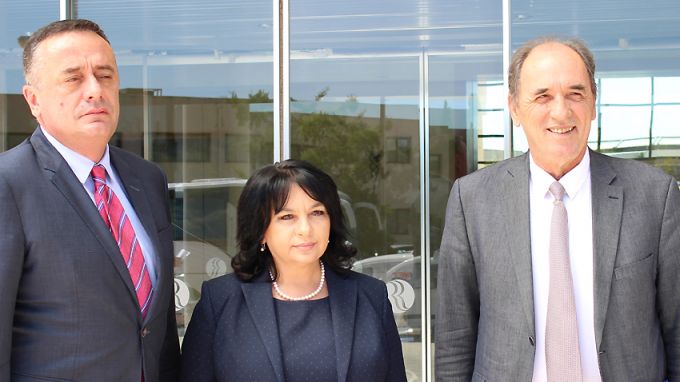
One day after Bulgaria’s Minister of Transport Ivaylo Moscovski and his Greek counterpart Christos Spirtzis signed in Kavala (Greece) an intergovernmental memorandum of cooperation aimed at expanding the project for new transport corridor between Bulgarian and Greek ports, Bulgaria’s Minister of Energy Temenuzhka Petkova discussed with her Greek counterpart Giorgos Stathakis and Serbia’s Energy Minister Aleksandar Antic the development of gas projects in that region. The meeting was held in the reek town of Alexandroupolis. The three ministers discussed at the tripartite meeting the construction of the so-called Vertical Gas Corridor between Bulgaria, Romania and Greece, as well as the construction of the liquefied natural gas (LNG) terminal near Alexandroupolis as a prerequisite for the fulfillment of the Balkan Gas Hub project near Bulgaria’s coastal city of Varna. The meeting was held within the frameworks of the 1st Oil and Gas Forum organized by the American-Hellenic Chamber of Commerce.
A day earlier, the idea about the Balkan Gas Hub project, which envisages gas supplies through the Bulgaria-Turkey border as well, was presented in Sofia to Turkey’s Minister of Energy and Natural Resources Berat Albayrak by Bulgaria’s Energy Minister Petkova and that country’s Premier Boyko Borissov. The accent during the tripartite meeting between Bulgaria, Serbia and Greece and the meeting between Bulgaria and Turkey fell on the security and the diversification of the gas supplies in the region. Turkey agrees with Bulgaria’s idea about a Balkan Gas Hub project, which includes gas supplies through the Bulgaria-Turkey border, too. Minister Albayrak pointed out that Ankara was open to any type of energy cooperation with Bulgaria which would lead to higher security of the energy supplies. Moreover, Turkey is interested in the possible construction of new power lines connecting Bulgaria and Turkey.
The Thursday talks in Alexandroupolis were an evidence of the progress of the gas projects in the region and a prerequisite for drawing new infrastructure routes. Thus, the ideas related to the provision of the necessary financing will be specified. Although some EU financing has been already allotted to the construction of the Greece-Bulgaria interconnector, which is already in an advanced stage, the project needs some additional financing. In the beginning of 2017 Sofia and Belgrade agreed that the construction of the gas interconnector between Bulgaria and Serbia should start by May 2019 and the gas interconnector should be completed in 2020. In June this year, during the visit of Macedonia’s Premier Zaev to Bulgaria, Sofia came up with the idea the Bulgaria and Macedonia should also build a gas interconnector. The gas operators of the two countries have been holding talks on this topic since 2012 and now Bulgaria and Macedonia are expected to launch a feasibility study. The development of the country’s power engineering is among the top priorities of Macedonia’s new government and that country has already found EUR 2 billion to build the necessary gas infrastructure. That is why the Bulgaria-Macedonia gas interconnector project stands good chances.
The latest developments of the regional gas projects are reason for optimism, yet many of them are still in the field of intentions. The transition from ideas to actual fulfillment highly depends on the progress of that region on its EU integration path.
English version: Kostadin Atanasov
Türkiye commemorates the victims of the devastating earthquakes of 2023 Türkiye honored the memory of the victims of the earthquakes of February 6, 2023, when 7.7-magnitude tremors in southeastern Turkey levelled entire..
In mid-January this year, eight Bulgarian cultural and educational associations from Bosilegrad, Tsaribrod, Zvontsi, Vranje, Pirot and Niš sent an open letter to the President of Serbia, Aleksandar Vucic, the Ombudsman, Zoran Pasalic, the Delegation of..
Fire kills dozens in Turkish mountain resort Kartalkaya 78 people died in a hotel fire in the Turkish ski resort of Kartalkaya in north-western Turkey. Celebrities and entire families were among the dead, and dozens..
"The 'Zhelyazkov' cabinet must continue to work, even as a minority government." This was GERB leader Boyko Borissov's comment on the Constitutional..

+359 2 9336 661
